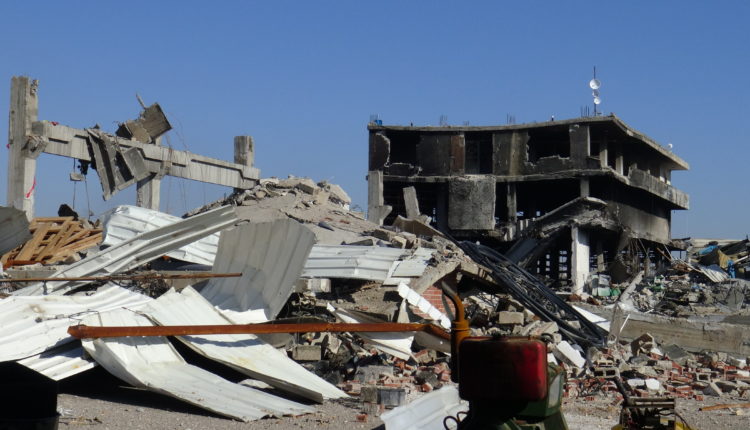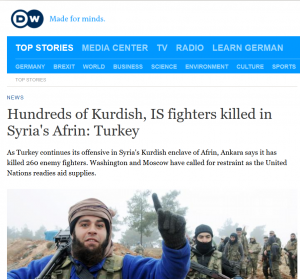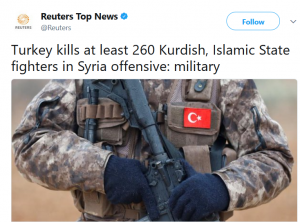Washington Kurdish Institute
January 31, 2018
Just over a week into the Turkish state’s campaign of military aggression against Afrin, a Kurdish majority city and area in northwest Syria, major global media agencies are learning first-hand about the true nature of the Turkish media. While the Turkish media, and the media of any country of tens of millions of peoples, is not monolithic, it has taken a fairly unified approach to coverage of Turkey’s latest war of choice, the Afrin campaign, and come out in support and with a common narrative concerning the reasons for this attempted invasion.
Since its founding almost a century ago, Turkey has steadfastly objected to any expression of Kurdish identity and any moves toward Kurdish self-determination – both inside and outside of Turkey’s borders. Turkey has made no secret that the primary objective of the Afrin campaign is to eliminate the People’s Protection Units (YPG), the predominantly Kurdish force that has proven to be the US-led coalition’s most effective and dependable Syrian partner in the battle against the ISIS terrorist group. While fighting YPG and, more generally speaking, fighting Kurds, is very popular among many segments of Turkish society, the Turkish state and media have proclaimed that Afrin campaign has an additional aim, which is to fight ISIS. However, as the US State Department Heather Nauert recently stated, ISIS is not present in that region. Indeed, Turkish statements to the contrary simply false and designed to provide additional pretense for the current campaign of unwarranted aggression against US-allied armed forces and innocent civilians alike. In keeping with historic practice, the Turkish media announces the supposed successes of the military campaign, complete with inflated enemy casualty numbers and no word of any effect on civilians . “Hundreds of” or “at least 260” Kurdish and ISIS fighters were killed in the first days of the Afrin campaign, according to the Turkish military. This number was not only parroted by the Turkish media, but also referenced by Reuters and the Associated Press (AP), the latter of whom retracted this erroneous report. Other media agencies, including DW.com, reported the same falsehood.
Another recent incident demonstrates the quality, and veracity, of Turkish media reports on Afrin. As reported by Newsweek and others, Turkish media quoted an unsourced tweet reporting that a former US Special forces soldier named Eddie Bragdon was killed in battle on Burseya Mountain. This post, intended to be satirical, was widely quoted and reported as breaking news. The supposed death of this American YPG fighter was cheered, with many Turkish language accounts on Twitter wishing him “hellfire”. However, there was one tell-tale sign that this incident had not actually occurred – the supposed picture of Eddie Bragdon was actually famous American actor Bradley Cooper playing the lead role in the movie American Sniper.
These incidents demonstrate to the world what observers of the Turkish media have known for a long time – it cannot be trusted to convey the truth. Rather, it acts as a means of propagating the Turkish state’s narrative and often spreading conspiracy theories. People inside Turkey who are far from the Kurdish regions of the country have been receiving most of their information on the Kurdish issue from such sources for decades, fanning the flames of ethnic hatred within the country, and now certain careless journalists in the world media are depending on these sources for factual information. Those tasked with reporting on events in Afrin should take great pains to represent the facts of the situation accurately, and treat Turkish media reports with the suspicion necessary.



